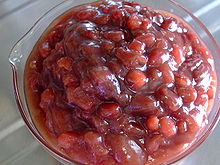anko
Jump to navigation
Jump to search
English
[edit]
Etymology
[edit]Noun
[edit]anko (uncountable)
- A paste made of azuki beans.
- Synonym: red bean
- 2018, Luiz Hara, The Japanese Larder: Bringing Japanese Ingredients into Your Everyday Cooking, Jacqui Small for White Lion Publishing, The Quarto Group, →ISBN, page 71, column 2:
- You can buy good-quality, canned ready-made anko from Japanese grocery stores or online, or make your own at home by following my Anko recipe on page 98.
- 2020, Shauna Holyoak, Kazu Jones and the Comic Book Criminal, Little, Brown and Company, →ISBN:
- Mom nodded at the head of her bed, and I sat down, handing her one perfect bun, toasted to a honey-golden crisp. She pulled it into two pieces, exposing the red anko center and a puff cloud of steam.
- 2022, Katherine Tamiko Arguile, Meshi: A Personal History of Japanese Food, Melbourne, Vic.: Affirm Press, →ISBN:
- Stir in the salt and mix thoroughly before allowing the anko to cool for serving.
- 2023, The Great American Recipe Cookbook: 100 Memorable Recipes to Celebrate the Diversity and Flavors of American Food, season two edition, Dallas, Tex.: BenBella Books, →ISBN:
- To make the anko filling, rinse the adzuki beans under cool running water until it runs clear.
Related terms
[edit]Further reading
[edit] Red bean paste on Wikipedia.Wikipedia
Red bean paste on Wikipedia.Wikipedia
Japanese
[edit]Romanization
[edit]anko
Votic
[edit]Etymology
[edit]From Proto-Finnic *hanko.
Pronunciation
[edit]Noun
[edit]anko
Inflection
[edit]| Declension of anko (type II/võrkko, nk-ng gradation) | ||
|---|---|---|
| singular | plural | |
| nominative | anko | angod |
| genitive | ango | ankojõ, ankoi |
| partitive | ankoa | ankoitõ, ankoi |
| illative | ankosõ, anko | ankoisõ |
| inessive | angoz | ankoiz |
| elative | angossõ | ankoissõ |
| allative | angolõ | ankoilõ |
| adessive | angollõ | ankoillõ |
| ablative | angoltõ | ankoiltõ |
| translative | angossi | ankoissi |
| *) the accusative corresponds with either the genitive (sg) or nominative (pl) **) the terminative is formed by adding the suffix -ssaa to the short illative (sg) or the genitive. ***) the comitative is formed by adding the suffix -ka to the genitive. | ||
References
[edit]- Hallap, V., Adler, E., Grünberg, S., Leppik, M. (2012) “anko”, in Vadja keele sõnaraamat [A dictionary of the Votic language], 2nd edition, Tallinn
Categories:
- English terms borrowed from Japanese
- English terms derived from Japanese
- English lemmas
- English nouns
- English uncountable nouns
- English terms with quotations
- Japanese non-lemma forms
- Japanese romanizations
- Votic terms inherited from Proto-Finnic
- Votic terms derived from Proto-Finnic
- Votic terms with IPA pronunciation
- Rhymes:Votic/ɑŋko
- Rhymes:Votic/ɑŋko/2 syllables
- Votic lemmas
- Votic nouns
- Votic võrkko-type nominals